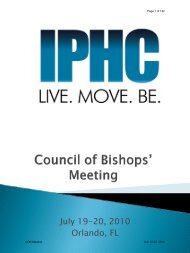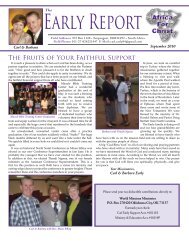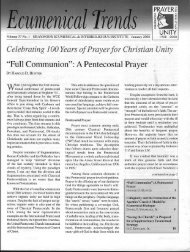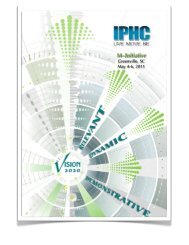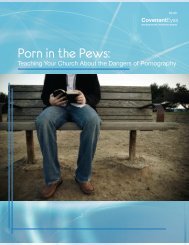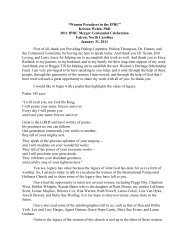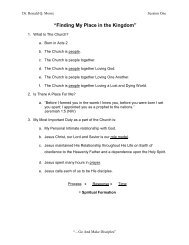IPHC Church Manual - Extension Loan Fund
IPHC Church Manual - Extension Loan Fund
IPHC Church Manual - Extension Loan Fund
You also want an ePaper? Increase the reach of your titles
YUMPU automatically turns print PDFs into web optimized ePapers that Google loves.
Constitution<br />
Article V. Understanding the Articles of Faith<br />
regenerated one from the hand of His beloved Son and<br />
places him in His heavenly household. Jesus the first-born<br />
Son – the Elder Brother – by virtue of the Father’s act of<br />
adoption, assigned to the newly acknowledged son his<br />
work and service in the heavenly family, or kingdom.<br />
Jesus, as the “first begotten from the dead” has the<br />
“preeminence among the brethren,” and by the<br />
appointment of the Father, has complete control of all the<br />
heavenly household; therefore, He gives to each one in the<br />
“household” his individual work. The Father, in accepting<br />
the “newly born” into His family, “sends forth the Spirit of<br />
His first-born Son into the heart of the adopted son,”<br />
making him a “joint heir with Christ.” The Spirit of the firstborn<br />
Son put into the heart of the “newly born” is the<br />
witnessing Spirit assuring him of his salvation and sonship.<br />
6. Sanctification<br />
Sanctification. The derivation of this word, from root to<br />
stem in both Hebrew and Greek languages (the original<br />
languages in which the Word of God was first written), may<br />
help to some extent in the definition of its meaning, but is<br />
not sufficient to set forth the vast scope of truth embraced<br />
by the word as used in both Old and New Testaments. The<br />
historico-ethical revelation of the word as connected with<br />
the manifestation of Jehovah to the patriarchs, to Israel,<br />
the elect nation, and to and through Jesus Christ in<br />
fullness, is the only way by which the full knowledge of the<br />
word as to its meaning can be obtained.<br />
Kadesh is the Hebrew word for sanctification and its<br />
equivalents. Its verbal stem is derived from the root dash,<br />
which primarily signifies to “break forth shiningly.” The<br />
Greek word used to translate kadesh is hagios. The 70<br />
men appointed from among the Jews to translate the<br />
Hebrew Scriptures into the Greek language, known<br />
historically as the Septuagint, in 287 B.C., used hagios in<br />
translating kadesh into that language.<br />
The first instance of the use of kadesh is in Genesis 2:3:<br />
“And God blessed the seventh day, and sanctified it.”<br />
The day “broke forth shiningly” in its sanctification.<br />
45




